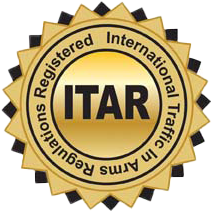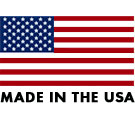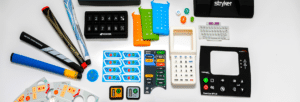Silicone is a very clean, odorless, and tasteless rubber. Advantages of silicone rubber include thermal stability, insulation from electricity, seal formation, compression set resistance, corrosion resistance, weather resistance, sound and vibration dampening, the ability to repel water and its’ natural flame retardant properties. Here, we will highlight some of the physical properties of silicone rubber that make it a versatile material for a range of industries and applications.
When compared to organic rubbers, silicone rubber can withstand more extreme temperatures. Silicone rubber can be used indefinitely from -100°F to 300°F and experience virtually zero change in its properties. It can withstand use at over 400°F for over 10,000 hours and some silicone rubbers can even be used around temperatures as low as -200°F and as high as 650°F for short periods of time. Along with the ability to perform in demanding temperature ranges, Silicone rubber can withstand harsh weather conditions. Ozone causes most organic rubbers to deteriorate rapidly, however, ozone has no effect on silicone rubber. Silicone rubber has also been shown to handle exposure to wind, rain, and sun for over 10 years with no change to any of its physical properties.
Silicone rubber is also resistant to water, oils, solvents, and other chemicals, and will experience no change in mechanical strength or electrical properties when submerged in water. This makes silicone rubber an ideal insulating material. Silicone rubber is also oil resistant, even at high temperatures. It is also virtually unaffected by polar organic compounds and dilute acids or bases. Silicone Rubber will swell with exposure to non-polar organic compounds such as gasoline, but, unlike most organic rubbers, silicone rubber will not decompose or dissolve and will return to its original state once the solvent is removed.
If silicone rubber is brought close to fire, it will not ignite easily. Our rubber products have received UL94 HB certification according to the UL94 (USA) standards for flammability classification. When burned, almost no black smoke or noxious gas is produced during combustion. These products are used in consumer electronics and business equipment; in closed spaces such as aircraft, subways, and building interiors. These silicone rubbers contribute to making all these environments safer.
Conductive silicone rubbers contain electrically conductive materials such as carbon. A range of products are available, with resistances from approximately 0.1Ω∙m to 100Ω∙m. Conductive silicone rubber is widely used for keypad contact points and high-voltage cable shielding.
Silicone rubber is chemically and physiologically inert. This means that silicone rubber will not cause other materials to corrode. This also means living tissues are not as affected by contact with silicone rubber than they are by exposure to other organic polymers. Silicone rubber is also compatible with FDA regulations and can undergo many different sterilization techniques. This allows silicone rubber to be used for applications such as baby bottle nipples and medical devices.
One of the greatest advantages to working with silicone rubber is the overall versatility of the material. This is what makes it a key material used in a wide range of industries. By slightly adjusting the compound mixture and/or adjusting curing agents/post-curing, the final product can obtain lower compression set, and more resistance to flame, water, steam, and temperature. It can be manufactured translucent or any color imaginable and because of its durability, it is extremely reliable and can be trusted to perform for a long time. SiTech utilizes many complex technologies to take full advantage of silicones’ capabilities; manufacturing everything from simple gaskets to highly complex keypads.








